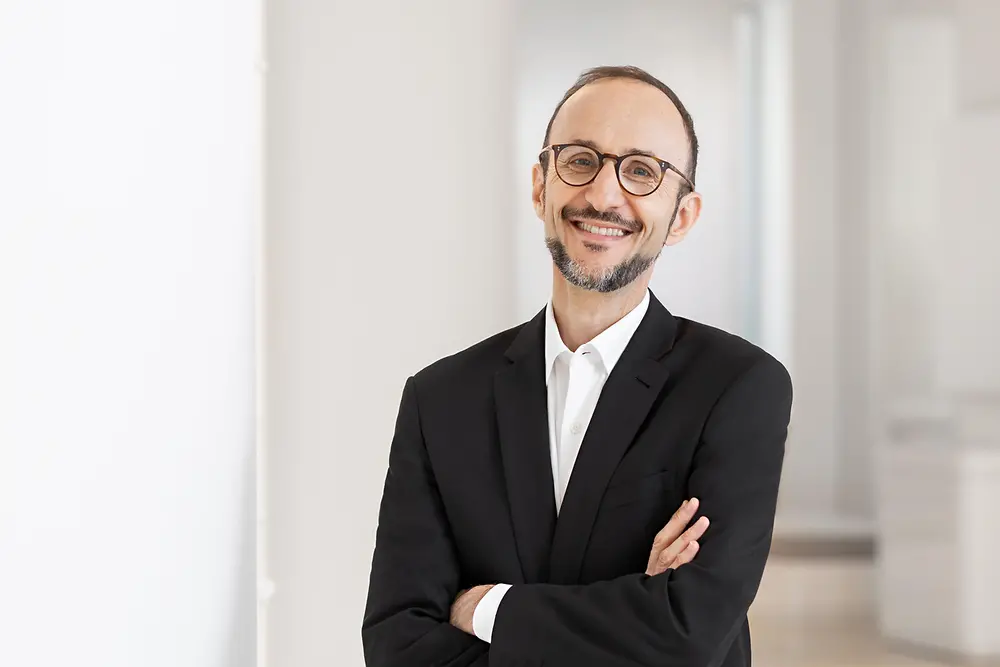Discover the brands and technologies from our business units Henkel Adhesive Technologies and Henkel Consumer Brands.
The future of business: What does it take to reinvent?

It’s one thing for companies to recognise they need to redefine the way they do business to succeed in an age of disruption. It’s another thing entirely to understand how to achieve that. How do companies get started on their transformation journeys to become more future-ready?
In my view, there are two integral components in particular: A business model capable of addressing the evolving needs with agility and, equally important, a strong organizational culture, in which people can unfold their full potential. What does this mean in practice? We need to create an environment in which employees can grow – both professionally and personally. In which we allow and encourage entrepreneurial thinking. And, as a global company operating all over the world, we need to collaborate across borders. The prerequisites are strong leadership, mutual trust and shared values.
This is even more important in volatile times. Speed is extremely high, and competition is accelerating. And so is the need for us as a global organization to be agile, fast, and flexible. We must adopt more agile ways of working and give team members greater decision-making authority. This requires leaders who think strategically and a culture conducive to constant reinvention. And, of course, we need a clear growth strategy, with future-oriented operating business models, that help us gaining competitive edge and capturing the full potential when it comes to innovation, sustainability, and digitization. Strategic focus is important, but at the same time we need to remain flexible and keep adapting and questioning.

When it comes to digital transformation, everyone talks about technology. But there is no digital transformation without cultural transformation. People are the driver, not the software.
Sylvie Nicol, Executive Vice President of Human Resources, and Infrastructure Services at Henkel
It is said that culture is the secret sauce for business. What are the keys to building a resilient organizational culture and how does it boost employee engagement?
Whether an organization’s employees and leadership realise it or not, every company has a culture. It’s defined by what the company stands for and even more concrete, it is the sum of all behaviours. Combining a strong company culture with great employee experiences is crucial for not only employee satisfaction, but also to forming a foundation for growth and success.
Workplace culture should instil a sense of purpose and belonging in every individual. Our company purpose “pioneers at heart for the good of generations” expresses what unites us at Henkel. Entrepreneurship, sustainability, and responsibility – also for our people. We have a diverse global workforce with employees from around 120 nations in more than 75 countries. This diversity and internationality make us strong.
We foster diversity by actively offering job rotations within the organization to enable our employees to broaden their skills and constantly think outside the box. This is part of the upskilling of our employees, which for us is extremely important, especially when looking at the speed of digitalisation changing the way we work.
Why is digital transformation important and why do they say it’s a journey not a destination?
Transformation, be it cultural or digital, is not an easy task. The key is to approach the transition as an ongoing journey where you can implement the right practises for your organization and make tweaks along the way. So even once you reach maturity across all dimensions, there will be a need for continuous innovation and learning.
At Henkel, we believe in utilising technology to its fullest. We employ a ‘data-driven’ approach that enables us to take strategic decisions based on data analysis and interpretation. Digitalisation help us to work faster, more efficient and agile, and offer many new opportunities for our businesses. When it comes to digital transformation, everyone talks about technology. But there is no digital transformation without cultural transformation. People are the driver, not the software. Technologies are only as good as we, as people use them. For me, it is all about how we use technology to reach the goals of our people and culture strategy. In doing so, we have to take all employees with us, no matter what level or age and no matter where they work. At Henkel, we have launched a company-wide digital upskilling initiative and this year have again significantly expanded our range of learning opportunities. But here again, our culture plays a crucial role. We need not just the offers, but a culture of lifelong learning. Passion. Fun. Therefore, we have initiated a company-wide “Learning Festival” in October.
The global pandemic has turned our work upside down. How did you deal with it?
During the crisis, everyone at Henkel has done a great job and has proven the ability to adapt, really stick together and delivering strong results in very challenging times. I find it almost inconceivable now how sceptical many people, including me, used to be towards mobile work in the beginning. We have proven that it works, even when forced upon us from one day to the other.
However, I am convinced that a strong company culture cannot emerge from purely virtual collaboration. Over these past months, we have once again shown how strong the Henkel spirit is and how we work together as truly one global team. But now, looking forward, we need to combine the best of both worlds – mobile work and office.
Much before the pandemic started, Henkel has been fostering a cultural transformation aimed at the growth of the company, and also the personal growth of all our employees. We are determined to capture this unique window of opportunity the pandemic has created - the openness of people to change their old habits and leave their comfort zones.
What do you personally understand by cultural transformation?
Cultural transformation is more than just a phrase. It’s a commitment to shifting a company’s culture to foster a sense of belonging among our employees. It is an investment in the long-term success of an organization. From my point of view, it is important that we start with ourselves. There is no cultural transformation without personal transformation. Being self-critical and open for change.
For a company like ours with around 145 years of experience in the markets, cultural transformation means progress and adaptation. Leaders play a vital role. Without a commitment from leaders to transform the culture, employees are not likely to make lasting behaviour changes on their own.
What are the challenges that prevent a company from adapting to change and how do you overcome them?
Embracing change is challenging and takes time, especially for big organizations with a long tradition. Change can produce internal resistance. We have to respect that and take people along for the ride. Through dialogue, active listening and concrete, tangible change. But change is inevitable and embrace change is both healthy and an urgent necessity. The past two years were a wake-up call for how much and how quickly change can happen.
How does inclusive leadership influence employees’ behaviour?
A strong and inclusive leadership creates an environment of trust and transparency that embraces entrepreneurial energy and empowers decision making. Inclusive leaders create a team atmosphere of mutual respect, recognize employees in their strengths and uniqueness, and bring out the best in the team and each individual through precisely that difference and diversity.
The ability to create and implement an effective DEI (Diversity, Equity, & Inclusion) strategy for an organisation is an expertise that comes from trainings and years of experience. That’s why at Henkel, we have rolled out inclusion training programmes for managers. These programmes cover topics such as unconscious bias or women empowerment and sensitivity training.
It’s important that our leaders are accountable. That means, we should measure leadership on these topics. It is not enough for executives to have expertise and deliver good numbers. Good leadership is also about empowerment, enablement, empathy, and inclusion.
Provided by the courtesy of Arabian Business, January 2022 issue








